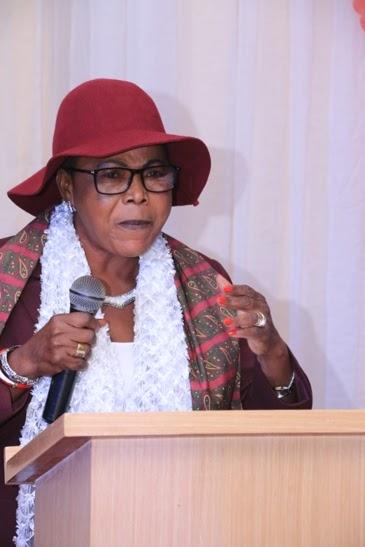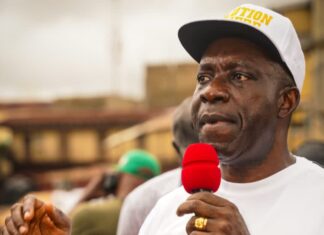By Nduka Uzuakpundu
She’s an entrepreneur of nearly four decades’ standing, whose reputation for diligence and commitment to the auto sector of the Nigerian economy makes her a heroine.
She’s someone who has doggedly refused to give up her entrepreneurial project, despite hostile government policies – especially since the structural adjustment programme (SAP) days of Babangida regime.
Today, given her renewed spirit to push ahead with guarded optimism of success, Princess (Mrs.) Mulikat Fehintola Sanni, could be described as one of the top economic partners of the Buhari administration, who should be assisted, as a matter of merit, to transmit to reality her dream and brilliant plan for the country’s auto sector.
The head of Mulifelong Nigeria Limited – a Lagos-based auto company – Sanni said that she wanted to be a visible player in President Muhammadu Buhari’s effort to diversify the Nigerian economy such that it would lean less on crude oil.
Her intent, thus, is to invite foreign technology, foreign direct investment (FDI), create jobs for Nigerians and be a reliable source of tax for government. But, currently, she feels deeply frustrated by some operatives of the Bank of Industry (BOI), in Lagos; individuals, whom, she said, have refused, for no persuasive reason, to give her a well-deserved loan that is in billions of Naira to embark on her-pro Buhari project.
Not so long ago, a business proposal that she crafted and presented to her partners in Seoul, from a company known as UKB South Korea, won the hearts of the policy-makers in that country. That was on March 16, 2018.
The skippers of UKB South Korea said they would invest in Sanni’s battery manufacturing project. As a sign of good faith and their readiness to that effect, two top officials of UKB South Korea came to Nigeria at her expense.
“That was an encouraging first step that they were ready to transfer the required technology in the auto sector to Nigeria,” Sanni pointed out.
At the Automotive Council of Nigeria, Sanni’s business proposal was approved in the presence of her South Korean partners. That nod by the Automotive Council of Nigeria was supposed to be the last step that should have given a merited access to the required loan in billions of Naira at the Bank of Industry.
But, said she: “At the Bank of Industry, my business proposal was also approved. They told me that it was okay, except that for what they said, unconvincingly though, was ‘government’s constraints’, they would not give me the loan.”
It remains a dubious excuse, what some supposedly very powerful elements – individuals, whom Buhari should flush out – at the Bank of Industry, called “government constraint.”
The loan being sought by Sanni and her South Korean partners, for one, has been approved by the Automotive Council of Nigeria; that it was safe to give it out to Sanni to execute her business plan. The loan, for another, is a fund earmarked for the activities of the Automotive Council of Nigeria, which Sanni and her South Korean partners are qualified to utilize.
And yet, she cannot access the loan at the Bank of Industry, in spite of a series of calls and advise from the Automotive Council of Nigeria. She hopes that Godwin Emefiele, the Governor of Central Bank of Nigeria, might be of help.
Two national budgets have been passed since the Automotive Council of Nigeria nodded at her business proposal. The attendant frustration, sprung by the Bank of Industry’s excuse of “government’s constraint”, has compelled Sanni, to speak out against what she perceived as cultivated injustice against her and what she sees, besides, as an attempt to cripple the Buhari administration’s effort at the diversification of the Nigerian economy in a post-recession period.
At a recent conference in Lagos, she retailed, the operatives of the Bank of Industry appealed to her not to air her nasty experience with them, in her effort to access some billions of Naira for Nigerian entrepreneurs deposited with the bank.
Since then, Sanni suspects that she’s being trailed; every move she makes appears being monitored. She thinks that she’s being spied on by the operatives of the Bank of Industry. It all smells foul and disturbingly sinister. But, in her bent to seek public intervention, she spoke out at a stakeholder’s forum on the Nigerian economy and African Continental Free Trade Agreement (AfCFTA), organized, recently, by the Lagos Chamber of Commerce and Industry (LCCI), at Commerce House, on Victoria Island.
Sanni’s cheerless, experience at the Bank of Industry has prodded her to unreel her personal tape of a familiar past: “My experience in the auto industry has been quite devastating. But I have refused to quit. The auto industry is key to any economy – probably second to the banking sector. The entire world’s economies rely heavily on the auto industry for the transportation of labour, goods and capital.
“Most of the active players in the auto sector of the Nigeria economy have folded up. Seven auto assembly plants – including Leyland, ANAMCO, Peugeot, Volkswagen, Steyr – collapsed during the SAP era. Big textile industries, too. Today, they have been purchased and converted to places of worship by a certain branch of the Christian faith. You can imagine all the huge investments lost, as a result of the death of those companies. The popular UTC has since ceased to exist.
“The SCOA known, in the ’70s and ’80s for its ubiquitous pick-up brands, too, perhaps. Federated Motors, known for it Bedford brand, whatever happened to it! Where’s the popular Bata shoe industry!
“Because of the unreservedly hostile economic policies of government, in the past, Nigeria is now a dumping ground of mainly tokunbo vehicles that are very difficult to maintain on our roads. We have, as a result, lost the skills of seasoned engineers and artisans – individuals who would have been part of government’s local content policy.
“These are people who can couple vehicles at plants. But, in place of giving them ample job opportunities, as in the auto industry, some individuals, who do not mean well for the economic development of this country, prefer to import tokunbovehicles.”
All that, said Sanni, is bad economics. Her honest appeal to Buhari is, “Let’s have assembly plants here. We need to get our economic priorities and direction right, so that Nigeria would be in a healthy champion of the much-awaited renaissance of the economic network of West Africa countries.
“That way, able-bodied Nigerians – a majority of whom are graduates of tertiary institutions would not be forced to leave for foreign countries like Libya or Algeria at the price of being treated as slaves, or Italy and Spain at the risk of getting swallowed by the tempestuous Mediterranean Sea.
“We have the sources to create jobs because Nigeria is almost immeasurably blessed. While some of us are labouring to boost the Nigerian economy, a group of unproductive elements are either making free money or bent on sabotaging the promising plans of the Buhari administration to reflate the economy. And yet such people say “no employment.”
With some assuring boldness, Sanni was of the view that, “When you see someone – an entrepreneur, so clearly defined without a streak or tinge of politics or that of an uncommitted portfolio investor – someone whose integrity has not been blemished by the gargantuan corruption for which the government of the People’s Democratic Party (PDP) was exquisitely famous – that person should be encouraged, in that he or she has come as a constructive and forward-looking partner of the Buhari administration to create jobs, generate tax and push the Nigeria economy forward.”
She insists that Buhari should probe the activities of the people in that bank.
- Advertisement -
- Advertisement -















